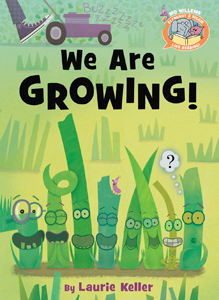Mo Willems & Laurie Keller Talk with Roger
Talks with Roger is a sponsored supplement to our free monthly e-newsletter, Notes from the Horn Book.

Talks with Roger is a sponsored supplement to our free monthly e-newsletter, Notes from the Horn Book. To receive Notes, sign up here.
Sponsored by![]()
 While — sob! — the beloved Elephant and Piggie went into retirement with last year's The Thank You Book, it seems that they are going to devote their golden years to reading, and thus Elephant & Piggie Like Reading! helmed by Mo Willems. One of the first two books in the series, Laurie Keller's We Are Growing!, won the 2017 Geisel Award as the most distinguished book for beginning readers published in 2016.
While — sob! — the beloved Elephant and Piggie went into retirement with last year's The Thank You Book, it seems that they are going to devote their golden years to reading, and thus Elephant & Piggie Like Reading! helmed by Mo Willems. One of the first two books in the series, Laurie Keller's We Are Growing!, won the 2017 Geisel Award as the most distinguished book for beginning readers published in 2016.RS: Laurie, is this your first early reader?
LK: It is, yes.
RS: What did you discover you had to do differently from a picture book?
LK: For one thing, using much simpler words, and fewer words. I had to keep the text pretty spare compared to what I would typically do in a picture book. My picture books have a lot of little jokes and asides that aren't necessarily part of the main story. I didn't include any of those sorts of things here. It was tricky to try to come up with an entertaining story with far fewer and simpler words. It was a great challenge. I loved it.
RS: How did you work with Mo on this?
LK: Mo was so helpful. I had met him a number of times, and I knew from his books how funny he was, of course, but it was really neat to be able to have his feedback. We did a couple of Skype sessions along with Tracey Keevan, his editor. He'd review what I had done up to a certain point. He's so great with comic timing, as you know. Working with him was like taking a master class in comic timing, because he could pinpoint right away if a section wasn't working. I remember him saying once, "No, you need a beat between this page and this page," and it was like, oh yeah, of course. I hadn't seen it, but being so good at what he does, Mo noticed it right away. Yes, he was very helpful.
MW: That's very sweet. The premise of the original Elephant & Piggie series, as we were getting started, was that they were a distillation of whatever neuroses I was going through at the moment, whatever questions I hadn't figured out. And with this new series I thought, I have all these friends who are neurotic. Instead of having to tap my neuroses, wouldn't it be interesting to tap theirs?
 LK: Did I tell you I was voted most neurotic in high school?
LK: Did I tell you I was voted most neurotic in high school?MW: I've been lucky enough to have made enough of these types of books that while I don't necessarily know what works, I know what doesn't work. I've got a sense of the rhythm and the form. With this series, I get to play with ideas that I would never have myself. Every now and then, I point out the potholes, or nudge them to come together, which is just a joy. I also learn a lot about everybody else's process. People create in different ways, so that has opened me up to different processes and experimenting. Laurie is a character person, so she came to the project with these blades-of-grass characters that we were able to literally grow a story around. She had them asking these great, fundamental questions: what should I be doing, and what do other people think I should be doing? Who am I?
RS: But Laurie, you address these questions in such an odd way. I'm reading along thinking, oh yeah, the theme is growing, kids are always growing, I can see the resonance — and then wham! Here comes the lawn mower. Cuts them down. Start over again. Now, what does this tell us about you?
LK: It did surprise some people. Others didn't bat an eye. That happens with all my books—I'll read them in a certain mood and think, "Gosh, what was I thinking that day? This is really kind of odd." But on other days it seems totally normal to me. So I don't know. I'm gathering it bothers people because the lawnmower seemed to be cutting off their heads, but to me it isn't like that. It's more like getting a haircut.
MW: I also think there's a deeper resonance here, because this is all about second chances. When you make a decision, you don't have to be locked into it. One of the ways that you grow is by starting over. There are all kinds of really powerful things in that moment, which is what makes this story work. Part of Laurie's personality is this ability to revise, to come back and to look at things from a different angle. I don't want to tell stories too much out of school, but Laurie Keller is the only person who sent me a card on my birthday and then sent me a revision.
LK: Only one revision? That's so unlike me.
 RS: With an easy reader, you're dealing with kids older than the traditional picture book age, but as you pointed out, you have to use a small vocabulary because they're reading on their own.
RS: With an easy reader, you're dealing with kids older than the traditional picture book age, but as you pointed out, you have to use a small vocabulary because they're reading on their own.MW: They're also super-independent. This is the time when you don't need your parents for a story anymore. You have a great degree of agency and independence. I think Laurie's story resonates because when you have that amount of independence, you're starting to ask yourself questions that the grownups in your life have been answering for you. Before that, you are a good kid, or you are a funny kid, because you're told that's who you are. But when it's just you and the book, you have to figure out who you are.
RS: When I was six years old, I was reading an I Can Read! book, Little Runner of the Longhouse by Betty Baker and Arnold Lobel, and my mother tells me I looked up from that I Can Read! book and said "I can read!" So, I think you're exactly right — the feeling that you can do this is really a liberating moment.
LK: Very much so.
RS: Now, I know that publishing easy readers is not an easy business. Publishers like to do them in series. What we have here is an interesting sort of easy reader series that's not a series. I've seen three of them, and each one has nothing to do with the other, except for the introductions from Elephant and Piggie. Will these continue to be individual? Will there be more books about the grass?
MW: The answer to that question is no, or not yet. The common thread of the series is that these are the books that Elephant and Piggie like to read. Elephant and Piggie are retired, so this is what they do in their spare time. What will they end up wanting to read? Time will tell. We've got to let that evolution happen as the series goes on. Right now, we've been focused on getting as wide a swath of creators as possible to set that tone. Any return of a character would have to be organic, would have to be, for example, Laurie saying, hey, I really want to do this, and me feeling that there's a story there, rather than just saying, yeah, we can get three books out of these characters.
 RS: When you say it has to be a book that Elephant and Piggie want to read, I'm reminded of doing a presentation once with Chris Van Allsburg where I had to pretend that Harris Burdick was a real person. What input do Elephant and Piggie have into this process?
RS: When you say it has to be a book that Elephant and Piggie want to read, I'm reminded of doing a presentation once with Chris Van Allsburg where I had to pretend that Harris Burdick was a real person. What input do Elephant and Piggie have into this process?MW: They have a very large input. They have a distinct aesthetic taste. They like books that are philosophical. They like books that are dialogue-driven. They like books that are about issues that they live with, in their own elephantine and porcine ways.
RS: Laurie, did you think much about Elephant and Piggie as you were creating your book?
LK: I did, yes, but then I had to be careful. A mistake I made when I submitted ideas initially was that one of them was too much like Elephant and Piggie, thinking that was what it needed to be. That's not what Mo was looking for. But I did definitely keep them in the back of my mind. It was tricky. Like Mo was saying, it had to be something that Elephant and Piggie would like to read, yet we shouldn't make anything that was too much like Elephant and Piggie, because why would you want to do that?
RS: Right — why would Elephant and Piggie want to read about Elephant and Piggie?
MW: They could just Google themselves! With the Elephant & Piggie Like Reading! series, we're picking artists who have a voice already. They have a sensibility. I don't want to make a book about blades of grass. That doesn't interest me. I want to make a book that Laurie Keller uses to express herself in this format. That's the key. That's what's going to keep it individual.
RS: I think you're all off to a really good start here.
MW: Thank you. It's all casting.
More on Mo Willems from The Horn Book
- "Why Books?" — Mo Willems's 2011 Zena Sutherland Lecture
- Horn Book Magazine review of The Thank You Book [Elephant & Piggie]
Sponsored by![]()
RELATED
RECOMMENDED
ALREADY A SUBSCRIBER? LOG IN
We are currently offering this content for free. Sign up now to activate your personal profile, where you can save articles for future viewing.







Add Comment :-
Be the first reader to comment.
Comment Policy:
Comment should not be empty !!!